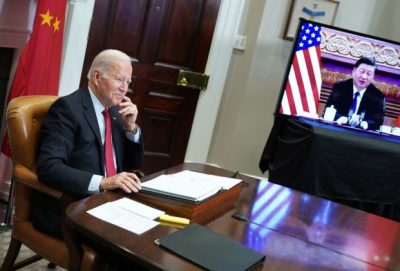“Boomerang Economics”: U.S. Should End Trade War with China to Alleviate the Economic Crisis at Home

All Global Research articles can be read in 51 languages by activating the “Translate Website” drop down menu on the top banner of our home page (Desktop version).
To receive Global Research’s Daily Newsletter (selected articles), click here.
Follow us on Instagram and Twitter and subscribe to our Telegram Channel. Feel free to repost and share widely Global Research articles.
***
Chinese Vice Premier Liu He held talks with US Treasury Secretary Janet Yellen on July 5 to discuss Washington’s trade tariffs on Chinese products and issues of global supply chain stability. According to Beijing’s press release, Liu stressed that the lifting of tariffs and sanctions, as well as the fair treatment of Chinese companies in the US, is a major concern for China. The US press release made no mention of changes to tariffs and instead mentioned the negative impact of the war in Ukraine for the global economy.
Both press releases did mention though that Liu and Yellen held discussions on the macroeconomic policies of the two countries, as well as global supply chain stability and global economic issues.
Given the fact that China’s chief trade negotiator spoke with Yellen, who has previously advocated for the removal of at least a significant portion of tariffs on Chinese products, it appears that tariffs are an important part of current discussions. This can only bring speculation that perhaps a thawing in the economic relations between the US and China is emerging, which is especially needed considering the economic troubles that the North American country is experiencing.
There is no consensus within the Biden administration on how to deal with China’s trade policy. Former President Donald Trump was belligerent and initiated a trade war. The trade war at its peak saw almost all Chinese exports to the US become subject to tariffs.
After that though, part of the tariffs were canceled and the so-called “Phase One” deal was signed, where it was expected China would increase the volume of goods purchased from the US by $200 billion over two years. However, tariffs on Chinese products totaling more than $300 billion remain in place.
At the beginning of his presidency, Biden did not make sudden moves in any direction and only talked about the comprehensive work of analyzing and revising his predecessor’s economic policies. In fact, none of the changes made by Trump have been amended by Biden.
The US is facing a new economic reality as the COVID-19 pandemic and the related economic crisis has forced authorities to resort to aggressive monetary stimulus measures. Ultra-low interest rates and quantitative easing has helped contribute to massive inflation in the US. In fact, American citizens have not experienced such price hikes in 40 years.
To help alleviate economic pressures, some US officials believe they have found a solution – lifting tariffs on Chinese goods in its entirety.
None-the-less, US National Security Adviser Jake Sullivan and US Trade Representative Katherine Tai opposed the tariff cuts. According to Tai, tariffs are a trump card in US hands, a lever to force Beijing to change its long-term trade policy. She said inflation is serious, but this is a short-term issue and the strategic task is to force China to comply with Washington’s demands. She believes that if tariffs were lifted, the US would weaken its negotiating position with China.
The reality is that China has not been greatly affected by the tariffs. Despite all the tariffs, China is not selling less goods to the US. In 2017, just before Trump kickstarted the trade war, the US trade deficit with China was $375 billion. In 2021, that figure was $396.5 billion.
Due to this reality, the main economic burden from the trade war actually falls on the shoulders of US consumers.
The Biden administration probably understands that the problem needs to be addressed as it no longer just a foreign policy issue, but a serious domestic one now. The Federal Reserve announced in June its largest interest rate hike in 28 years to try and control inflation, which hit a 40-year high in May. Some experts now believe that the US is in recession.
For this reason, it is clear that the US has decided to slowly move towards a gradual thaw in economic relations with China.
Although Washington seemingly wants a thaw in its relations with Beijing, differences, such as the causes of global instability in supply chains and economic processes, will make this a difficult task. However, investors still see this dialogue between the US and China as an undeniably positive signal, with stock exchanges reacting with enthusiasm, which could encourage Washington to end its trade war.
*
Note to readers: Please click the share buttons above or below. Follow us on Instagram and Twitter and subscribe to our Telegram Channel. Feel free to repost and share widely Global Research articles.
Paul Antonopoulos is an independent geopolitical analyst.
Featured image is from InfoBrics

